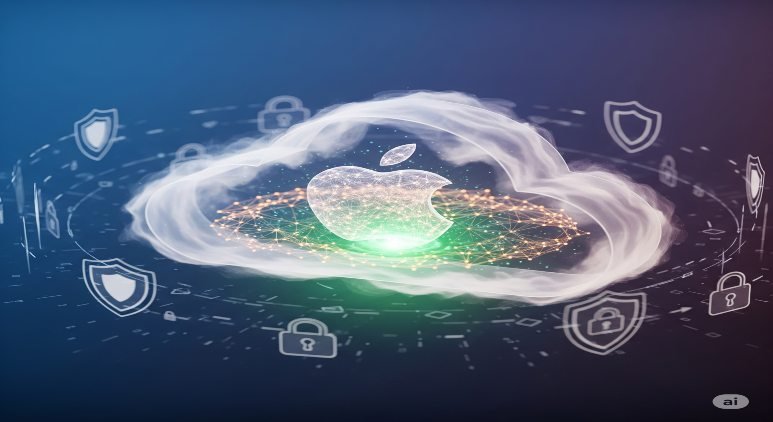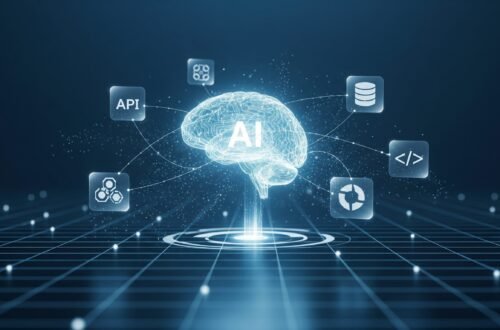Apple just dropped a bombshell at its latest WWDC, & it wasn’t a new iPhone color. It was “Apple Intelligence,” their long-awaited answer to the AI craze. While everyone else was busy hoovering up your data to train their chatbots, Apple was apparently playing the long game, plotting a privacy-first approach. The centerpiece of this grand plan is something called Private Cloud Compute (PCC). Apple claims it’s a revolutionary model for AI that keeps your personal info private, even when it needs the power of the cloud. But let’s be real: in a world where “privacy” is often just a marketing buzzword, is PCC a genuine new standard for the industry, or is it just a fancier, more expensive cage for your data? Let’s dig in.
So, What Exactly is This “Apple Intelligence” Thing?
Before we get to the cloud part, let’s quickly get on the same page. Apple Intelligence isn’t one giant AI model like ChatGPT. Think of it as a suite of smaller, specialized models baked directly into the operating system of your iPhone, iPad, & Mac. For a lot of what you’ll do – like summarizing an email or creating a funky Genmoji – your device handles it right there on its own silicon. This is nothing new, really; on-device processing has been the gold standard for privacy for years. The tricky part comes when your request is too beefy for your phone to handle alone. That’s where Private Cloud Compute enters the chat.
The Elephant in the Cloud: Private Cloud Compute Explained
When your iPhone decides your request to “write a ten-page fantasy epic about my cat” is a bit much, it needs to phone a friend. Instead of sending your data to some random, generic data center, it sends a request to one of Apple’s custom-built PCC servers. This is where Apple’s big claims start.
How It’s Supposed to Work
The whole system is designed around a simple, powerful promise: your data is never stored on these servers, & even Apple can’t access it. According to their own deeply technical blog post on the matter, the process is built on a few key pillars:
- Stateless Computation: The servers are designed to be “stateless.” This means they use your data to fulfill your request & then it’s gone. Poof. No permanent storage, no user profiles being built, no data being held for future model training. Your request is processed in memory & then wiped.
- Cryptographic Proof: Your iPhone is a skeptic. Before it sends any data, it cryptographically verifies that the cloud server is running the exact same software that Apple has publicly promised. If the server’s code has been tweaked in any way, your device will simply refuse to connect. It’s like a digital secret handshake.
- Custom Silicon: These aren’t just off-the-shelf servers. Apple built them using their own Apple Silicon, extending the same security architecture found in your iPhone (like the Secure Enclave) all the way into their data centers.
The biggest, most audacious claim? Apple is allowing independent security researchers to inspect the software images that run on these PCC servers. This is the ultimate “don’t trust us, verify it” move. It’s an unprecedented level of transparency for a cloud service of this scale.
Okay, But Is It *Actually* Private? Let’s Get Critical.
On paper, this all sounds incredible. Genuinely. But a healthy dose of skepticism is always warranted when a multi-trillion-dollar company talks about privacy. The model isn’t perfect, & the devil is, as always, in the details.
The Good Stuff (Why It *Could* Be a New Standard)
Let’s give credit where it’s due. Compared to the status quo, PCC is a massive leap forward. Most other AI services operate on a model of “send us everything, & we’ll figure out what to do with it later.” Your queries to many popular AI chatbots are often used to train future models, reviewed by human contractors, & tied directly to your account. PCC’s stateless, verifiable design is fundamentally more private. As tech analyst Ben Thompson notes, this move puts immense pressure on competitors like Google & Microsoft. They can no longer just say “we value your privacy;” they now have to contend with a competitor offering technical, verifiable proof.
This is a potential game-changer for user expectations. We might start demanding verifiable computation as the baseline for any sensitive cloud processing, not just accepting flimsy privacy policies we never read.
The Skeptic’s Corner (The Gilded Cage Part)
Now for the reality check. While Apple’s engineering is impressive, it doesn’t exist in a vacuum. There are some serious caveats.
First, the “independent verification” sounds great, but who are these researchers? How often can they check? What’s the process? Transparency is only as good as its implementation. A one-time check isn’t the same as continuous, adversarial auditing. It’s a fantastic promise, but the follow-through is everything.
Second, let’s talk about government demands. Apple’s PCC servers are physically located in various countries, making them subject to local laws. While Apple says the system is designed to prevent them from accessing specific user data, they have a history of complying with government requests. For the last half of 2023, Apple complied with 81% of U.S. government requests for device data. While PCC is architected differently, a sufficiently motivated government agency could still try to compel Apple to change its software or gain physical access to servers. It’s not an impenetrable fortress.
Finally, and most importantly, there’s the giant OpenAI-shaped hole in this privacy blanket. If your request is *still* too complex for PCC, or if you want broader world knowledge, Siri can offer to hand your query off to ChatGPT. Apple is very clear that you’ll be asked for permission first, but once you agree, you’re playing by OpenAI’s rules. Your data is no longer protected by PCC’s promises. You’re leaving Apple’s walled garden for the wild west, & all the privacy assurances go out the window. This is a critical distinction that many users might miss.
What This Means for the Industry & For You
Apple has thrown down the gauntlet. The company is betting that users care enough about privacy to appreciate this complex, expensive solution. The pressure is now on Google, Microsoft, Meta, & others to explain their own cloud AI privacy models with far more technical detail.
Actionable Tips for the Rest of Us
When Apple Intelligence rolls out this fall, don’t just blindly click “agree.” Here’s how to stay sharp:
- Watch for the Hand-off: Pay attention to when Siri or another feature asks to send your query to the cloud. Apple promises a clear indicator when a request is being processed by Private Cloud Compute.
- Beware the ChatGPT Gateway: Be *extra* cautious when you’re offered the option to use ChatGPT. That’s a one-way ticket to a different company’s privacy policy. Unless you need its specific capabilities, it’s probably best to stick within Apple’s ecosystem.
- Read the Fine Print: Keep an eye on reports from the security community. The promise of independent verification is only valuable if researchers actually do it & report their findings. Follow security journalists & researchers who will be digging into this.
- Stay Updated: This almost goes without saying, but always install OS updates ASAP. They contain the latest security patches that make this whole system work.
The Verdict: A New Standard with Big Asterisks
So, is Apple’s Private Cloud Compute a new AI privacy standard? Yeah, it probably is. It sets a new, verifiable baseline for how mainstream companies should handle sensitive data in the AI era. The combination of on-device processing by default, stateless cloud servers, & public verification is a powerful statement that puts user privacy ahead of data hoarding. It’s a genuine innovation & a welcome change from the rest of the industry’s playbook.
But it’s not a magic shield. It’s a standard with footnotes. Its integrity relies on Apple’s continued commitment to transparency & the rigor of independent audits. Its protections evaporate the second you tap that button to use a third-party model. It’s a gilded cage, yes, but one that’s far more secure & respectful of your info than the open-air data farms most of us currently live in. It’s a massive step in the right direction, but true privacy still requires your most important tool: your own vigilance.




